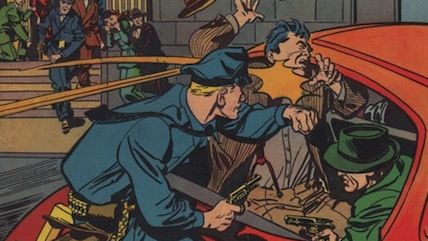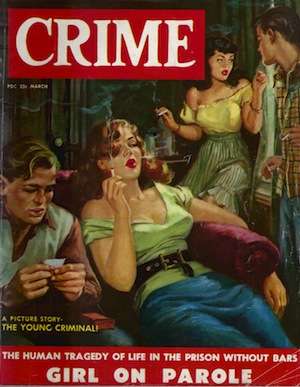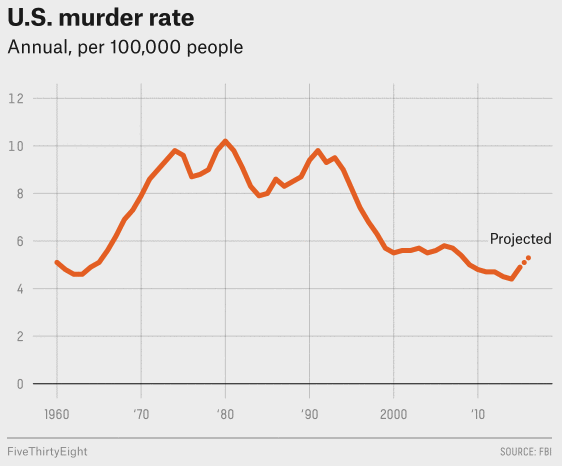FBI: Violent Crime Up, Property Crime Down
The bureau releases preliminary crime numbers for the first half of 2016.


The FBI has just put out its preliminary report on crime in the first half of 2016. The news is mostly bad, with violent crime increasing 5.3 percent since the previous year. Since the FBI's stats also showed violent crime going up in 2015, there's a good chance we're on track for two consecutive years of rises. (The full report on 2016's crime rates won't come out until the fall.)
Specifically, the report shows murders up 5.2 percent, aggravated assaults up 6.5 percent, violent robberies up 3.2 percent, and rape rising either 3.2 or 3.5 percent, depending on how you define the crime. (The FBI revised its definition of rape in 2013, but it continues to offer statistics for both the old definition and the new one.) Property crime, on the other hand, showed a very slight decline, though one particular property offense—auto thefts—became more common. All this is roughly similar to the trendlines from 2015, which also saw an overall increase in violent crime, an overall decrease in property crime, and an auto-theft exception to the property-crime decline.
Since this year and a half of increases follows a two-decade drop in crime rates, these levels remain low by historical standards. (That's not true of some specific places, such as Chicago and Baltimore, that are undergoing undeniable crime crises. But these numbers offer a nationwide perspective.) The unanswered question is what these rises represent. Is this a new trend that threatens to undo the gains of the '90s and '00s? Is it a temporary shift, comparable to the brief hike we saw in the mid-'00s before the rates resumed their fall? Or is it something else?
John Pfaff, a Fordham law professor and the author of the forthcoming Locked In: The True Causes of Mass Incarceration and How to Achieve Real Reform, offers a third hypothesis. "Sometimes a rise in crime is causal—the rise in murders that started in 1985 was due to crack-market related violence," he says. "But any rise (or fall) in crime is also partly just noise. So it's perfectly plausible to look at, say, murder rates and say that the mean was about 9 per 100,000 during the high-crime era, with a lot of 'noisiness' around that. The same story may be true now: Perhaps with hindsight we'll realize that the mean murder rate is now going to be around 6, with some good or bad years on either side of that. What some are viewing as a 'rise in crime' could instead just be more a regression to the mean, and to a mean that is still much lower than it was 20 years ago."
Just to muddy matters more, the other major measurement of crime in America—the National Crime Victimization Survey—actually showed nonfatal violent crime going down in 2015. (We do not yet have their 2016 results.) The FBI's count and the NCVS count each have their strengths and weaknesses, so that isn't a rival narrative so much as it's a sign that there are limits on our ability to perceive the "real" crime rate. There are two major measurements of crime in America, and at the moment they diverge. (For more on the differences between the NCVS numbers and the FBI's numbers, go here.)
Murder, in any event, does seem to be on track to go up for two years running. The NCVS doesn't cover homicides (by definition, murder victims can't be surveyed), and the FBI numbers probably aren't far off (as the saying goes, bodies are hard to hide). While we don't have the FBI's numbers for the second half of 2016 yet, many jurisdictions do have preliminary counts for the full year. Over at FiveThirtyEight, Jeff Asher has gathered data from most of the country's big cities, and he's projecting that we'll ultimately see a national rate of about 5.3 murders for every 100,000 people in 2016—slightly less than in 2008:

So the numbers are still far lower than in most of the last half-century, but that line isn't pointing in the direction we want. Pfaff, who worries about the costs of overreacting to crime as well as the costs of crime itself, offers this takeaway: "Don't be complacent, but don't panic."
Editor's Note: As of February 29, 2024, commenting privileges on reason.com posts are limited to Reason Plus subscribers. Past commenters are grandfathered in for a temporary period. Subscribe here to preserve your ability to comment. Your Reason Plus subscription also gives you an ad-free version of reason.com, along with full access to the digital edition and archives of Reason magazine. We request that comments be civil and on-topic. We do not moderate or assume any responsibility for comments, which are owned by the readers who post them. Comments do not represent the views of reason.com or Reason Foundation. We reserve the right to delete any comment and ban commenters for any reason at any time. Comments may only be edited within 5 minutes of posting. Report abuses.
Please to post comments


The NCVS doesn't cover homicides (by definition, murder victims can't be surveyed)...
Thursdays this fall on CBS: Heaven's Census Taker. Or maybe, Angel with a Clipboard. I don't know, bounce the title off Marketing.
"Bounce this off Marketing." The new sitcom for CBS coming in the Fall of 2017. It's a show about marketing a show to television.
That could actually be done really well, I think. Send-up of TV douchebags, plus you could run "clips" from "pilots".
That could actually be done really well, I think.
Yeah, but you'd need an Alec Baldwin or Larry David-style personality to really carry the show, you know? Some real talent like a Gary Shandling or Louis C.K. Somebody else who can convincingly and effortlessly play a monstrous asshole without getting offended by being labeled as a monstrous asshole. That's what's been missing from TV all these years self-deprecating Hollywood humor.
I think I've already seen my favorite alt text for 2017. Not much to live for now.
+1 ripped bodice
Shackford can do better. But it's good to see he'll have competition this year.
violent crime increasing 5.3 percent since the previous year.
***cough***Chicago***cough***
Didn't look at the raw numbers, but didn't I read recently that if it weren't for California and New York that Trump would have lost the popular vote by only 200,000?
Herself's margin was @ 2.9mm.
She won California by @ 4.3mm, and NY by @ 1.7mm.
I think I saw an analysis that if the D/R ratios had been close to historical norms in those states, she would have barely won the popular vote.
I initially responded with a snicker that she ran a campaign in California at all. It seemed like a huge waste of funds.
Suppose you assume that they actually knew she was actually losing all along because they fudged poll numbers to create what they wanted most (a wide margin of support). In other words "fake it 'til you make it." And that's why they were getting increasingly desperate near the end of the campaign. The numbers just weren't going up.
So campaigning in Cali was specifically a hedge to create the conversation about the electoral college when she lost. It was intended to create hostility for the other guy and sympathy for them. It was done specifically to create protests and #NotMyPresident tweet storms. It was intended to sow unfounded fear about the "dangerous" intruder coming into power. Wikileaks already showed that the "Trump has ties to Putin" narrative had been spun well in advance in their campaign strategy. It was evident by poll data that third-party voters would come out stronger than ever (even the fudged numbers reflected this).
If the data doesn't fit the model, change some assumptions. In this case, assuming that HRC knew all along that she was going to lose to Trump, it actually makes perfect sense she would campaign to increase turn-out in states she had no way of losing. Perhaps everything that happened was predicted and planned for and the biggest lie of the campaign was that she had a shot at all.
First I thought WTF??! Then I reasoned maybe you could sell that story to Hollywood for a movie script.
I'm more interested in the 2015 FBI hate crime statistics. 24% of offenders are black. Because black-on-white hate crimes are basically irrelevant by their counting, this means that a larger percentage of anti-Jew and anti-gay hate crimes are committed by black people. I'm sure this will be an issue brought up. Right?
By the same logic used to complain about other racial discrepancies in crime offenses, hate crime laws are actually disproportionately hurting blacks instead of helping them.
"Mr. President, we must not allow a hate crime gap!"
Its way up where I live. There's some violence going down all day, all night around here.
Property crime is up where I live. Although not that much from 2008.
There's a whole lot of minor property crimes that aren't reported, because people know the local po-po won't do shit about them.
this is true. Additionally, there are many crimes cops dont do shit about especially Identity theft or crimes inside a family.
It magically becomes a civil issue like laws don't affect family to family issues.
Investigating every single instance of identity theft would get expensive. It's better to go after the bigger fish. Plus the more we demand that police go after identity theft, the more they will demand additional access to our private data. Most companies have become pretty effecient at handling identity theft fraud without the help of the government.
Nice tits!
Are we going to consider the possibility of a Ferguson Effect?
I'm glad I'm not the only one ready to mention that. I call foul on people like Robby who argue that BLM is some sort of noble justice advocacy group. BLM would be nothing if not for media personalities giving them cover.
Are unnecessary violent actions by the police considered crimes?
Didn't think so.
And every law passed is another excuse for the police to get unnecessarily violent.
Smooches.
Question: Could the decline in murders simply be associated with advances in medical technology that saves more gun shot victims, etc? Whereas in the past victims would have died and the incident would have been classified as 'murder', now the victim survives and the incident is classified as an 'assault'?
Partly, I noted in an earlier post that the number of people shot in Chicago was over 4,000 and the murders by gunshot was around 700. 20-30 years ago a number of those shot and wounded would have been dead.
Strangely it may contribute to the violence. If someone shot and wounded me and mine I'd take it a bit personally.
In 1990 there were over 2,000 murders in NYC, while last year there was over 300. Therefore, I doubt medical advances have changed to the point where something that results in a difference of 1,900 people. NYC is an outlier though, which I understand.
Could the decline in murders simply be associated with advances in medical technology that saves more gun shot victims, etc?
I've seen arguments to that effect, but there was probably a decline in nonfatal shootings at the same time the murder rate was dropping.
(I say "probably" because one source of data?the CDC?says otherwise. But there are good reasons to be skeptical about the CDC data, which are based on a sample of just 63 hospitals and have a huge margin of error. For more on that, go here.)
Would read.
Is it really a crime if it is just property? /Bernie-Stein 2020
Without commenting on the rightness or wrongness of the policies, it seems oddly coincidental that a precipitous decline in crime rates followed the couple decades of ever-tougher "tough on crime" policies, while it's been marginally increasing during the last couple years when those policies have been marginally undergoing reform (at the behest mostly of the racial grievance industry, although libertarians are happy to claim credit for it). It could be that from a utilitarian standpoint, those policies actually do reduce crime and that criminal justice reform would result in higher crime rates. But then that would mean the New Libertarian Man narrative might be a bit off, so best not to entertain such possibilities.
Does this include property crime committed by law enforcement?
One of the more recent ideas actually makes a fair amount of sense, once I thought about it ... lead poisoning. Between unleaded fuel and getting rid of lead based paints, the exposure rates have gone way down. One of the effects of low level lead poisoning is lack of impulse control. Lead poisoning is also one of the more recent ideas on part of why the Roman Empire fell apart the way it did ... all their aqueducts and cisterns were lined with lead.
Worth thinking about, but no way to assign hard numbers to it.
I believe that was discussed in, "Lead Poisoning and Related Antisocial behaviors in Urban Environments: A Review"